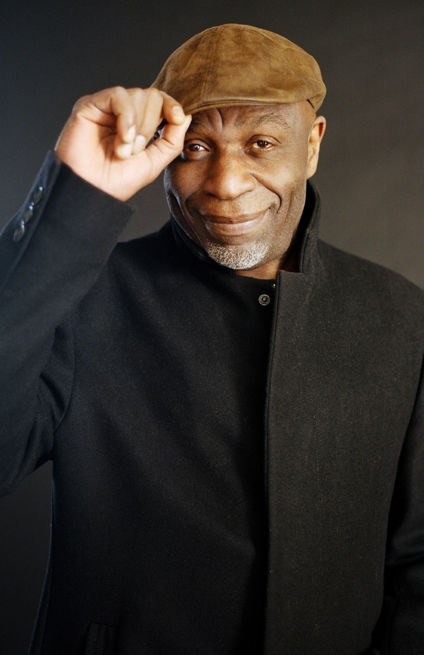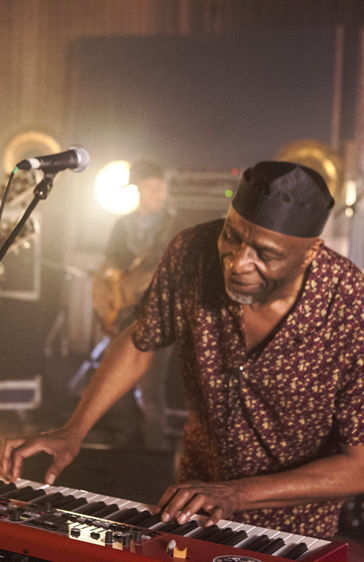Ray Lema
Origin: Congo RDC
There are rare musicians that you must not lose. Mingling jazz, classical music and African rhythms, the congolese musician and composer Ray Lema affirms his speech and his universe through a rich and warm music.

About us
There are rare musicians that you must not lose. Revered Paris-based Congolese pianist Ray Lema is one of the most innovative and creative names in African music. Mingling jazz, classical music and African rhythms, the congolese musician and composer Ray Lema affirms his speech and his universe through a rich and warm music.
Touring bands:
duo 2 pianos with Laurent de Wilde
African jazz quintet
Rumba jazz
From the height of its three quarters of a century, Ray Lema faithfully pursues its adventurous path on the roads of music. From classical to jazz, from traditional Kongo rhythms to those of the Gnawas through the Bulgarian choirs, the man decided to make sweat all those who like to store music in boxes.
Born in 1946 and raised in a Protestant family, the boy wanted to become a Catholic priest. He was then sent to the college seminary near Kinshasa. The white fathers on charge detected his musical aptitudes and directed him to study the piano and play the organ during the masses. The training is austere, but solid. The Congo gains independence and our organist who has a certain freedom of thought gives up the seminary to study chemistry at the university. But his passion for science fades and he gives up to everything but music. He plays with Gérard Kazembe’s orchestra the hits of Europe and plays rock with the band “The Yss Boys”, being considered a bit strange in Kinshasa, where the rumba is the queen and has the monopoly of the musical nights. But it is precisely because he is a UFO, trained in the rigors of Bach and in classical composition, that he is entrusted with the musical direction of the newly created National Ballet of Zaire. His mission: Go around the Congo to hire musicians, singers and have them play all together to represent the country. In this immense territory which is not yet a nation, the challenge is more complex than it seems. But he discovers the incredible musical diversity of his fellow citizens and the science of rhythm which is rooted in everyone, since music, singing and dancing are part of everybody’s life. This research will leave a deep imprint on his whole life. His dismissal from the National Ballet also, when at the end of the 1970s, he refused to compose an opera to the glory of Mobutu, the “king of Zaire”. His house, car, orchestra are taken away by the government of Mobutu. This is the moment that the Rockefeller Foundation chooses to offer him a scholarship and the airfare for Washington that goes with it. Ray flies away from Zaire, not knowing that he will never set foot in his country for more than thirty years.
In the country of jazz, he crosses paths with Stewart Copeland, the drummer of the group The Police who helps him for his first record, Koteja. But the life on this continent-country which ignores everything from the rest of the world does not fit him. In 1980, he decided to pack up and flew to Brussels, then Paris. The pianist was just waiting for that: new adventures.
His first record, Kinshasa-Washington DC-Paris (1983), is a mix of all the sounds that made him a musician. Two years later, his new album, Médecine, is recorded in a studio transformed into a laboratory, to all kinds sounds: synths, Kongo choirs, funky rhythms, djembé where he calls the forces of the universe with a great jubilation. Behind his keyboard, he is like a drummer and he keeps his inspiration from the rhythmicians he worked with in Zaire. Original soundtracks (Black Mic Mac), or with the band (le Bwana Zoulou Gang) with Higelin, Bashung, Dibango and Couture… with his bands or solo, Ray Lema multiplies creations on stage and on disc. Il incarne à lui seul le concept de sono mondiale cher à Bizot, avant que les marketeurs ne le récupèrent pour en faire la world music. The album recorded with Professor Stefanov and his Bulgarian choirs, or Safi with the Moroccan Tyour gnawas are perfect examples.
Jazz, which is the music of crossing worlds, remains one of his best companions. In duo with Joachim Kühn or Laurent De Wilde, or with his quintet, he digs his own groove, engraved in the wax of many albums. He also defends an “African” concept of Jazz, very collective, which you can feel in the respect he shows to the musicians who play with him. And it’s even better if there are many of them ! Nothing makes him more happy than collaboration with classical orchestras. From Sweden to Brazil through China and Cuba, those last 20 years he has been invited by orchestras to play his musics in symphonic versions.
Even if traveled and played in concerts all around the world, Ray Lema never came back in Zaire, which in the meantime was called again Congo . But, his country never left his heart. He kept using the Congolese rhythmic tricks on the piano and the sebene, this typical phase of rumba which is the base of the dance and the trance of congolese music.
In 2012, the creation of the project Station Congo gave him the opportunity to go back to his country. Thirty-three years later, he could reconnect with the ocean of rhythms of his country. This come back to his roots gave birth to a magnificent album, Nzimbu, a tribute to the cultural heritage of the region of his birth (the central Kongo), and he returned very recently (2019), to Kinshasa for a tribute to Franco Luambo, the boss of the OK Jazz and a monument of Congolese rumba. For the time of a magical concert (available on CD), Ray Lema bought back to life Franco Luambo Makiadi who, more than any other, relied on traditional music to compose THE rumba which made all Africa dancing. Somehow it completed the circle for Ray Lema who has always tried to get together his Congolese heritage with his Western education, and to marry them with other cultures. Ray Lema went back to Paris satisfied. Sitting at his piano, he is now working on his next adventure.
Associated Projects
Line-up: Ray Lema (piano) & Laurent de Wilde (piano)
Two pianos duo. A thrilling melodic dialogue. The piano with four hands like a call for air, a breath of fresh air, a seductive beautiful escape. Jazz, classical music, African music mix and overlap in the service of a unique song, that of two great artists passionate about encounters between worlds.
Line-up: Ray Lema, piano - Agnès Pyka, violin - Anne-Lise Durantel, violin - Sébastien Levy, alto - Eric Villeminey, cello
When Congolese musician Ray Lema meets Le quatuor Des Équilibres, borders fall and notes fly. Classical music blends with jazz sounds and African rhythms. Ray Lema - who has collaborated with such varied artists as the Tyours Gnaoua d'Essaouira and Les Voix Bulgares - once again composes music that takes us elsewhere... Des Équilibres likes to put Western art music into dialogue with other approaches: contemporary dance with Thierry De Mey, Japanese tradition with Shiro Daïmon or Algerian music with Nour-Eddine Saoudi.
Line-up: Ray Lema (claviers & voix), Fredy Massamba (voix), Ballou Canta (voix), Michel Alibo (basse), Dharil Esso (batterie), Irving Acao (sax ), Rodriguez Vanguama (guitare), Sylvain Gontard (trompette), Michael Joussein (trombone)
On his latest album, he pays a moving tribute to Franco Luambo, icon of Congolese rumba and founder of the Almighty OK JAZZ. With the eight musicians in his band, he revisits this repertoire while infusing it with contemporary sounds, thanks in particular to the drums and a flamboyant brass section. It's impossible to sit still while listening to these irresistibly groovy tunes!
After the uppercut On entre K.O, on sort O.K, his tribute to Franco, acclaimed by critics and acclaimed by audiences across the globe, Ray Lema continues his declaration of love to the music of his childhood, his madeleine de Proust: Congolese rumba.
The former “ngembo” (bat in Lingala) of Kinshasa's “ngandas” (musical bars) revisits the standards and classics of legendary orchestras from the golden age of this UNESCO intangible heritage: Franco Luambo, Tabu Ley, Franklin Bukaka, Docteur Nico, Wendo Kolosoi, Les Bantus de la Capitale, Franck Lassan, Les Grands Maquisards, Les Frères Soki de Bella Bella.
At the end of 2021, Congolese rumba became part of humanity's intangible heritage: a sign of the importance of this musical style in the history of world music.Its songs in Lingala, its electric guitars and its “kings of SAPE” left their mark on the 20th century.
Once again, the “savanturier” and his crew are at it again, with one leitmotiv: to pass on to the next generation this priceless musical treasure that will knock your socks off.
Concerts

| Date | Concert | Place |
|---|---|---|
| 13 May | Laurent de Wilde - Ray Lema / La renaissance | Oullins (69) La renaissance |





